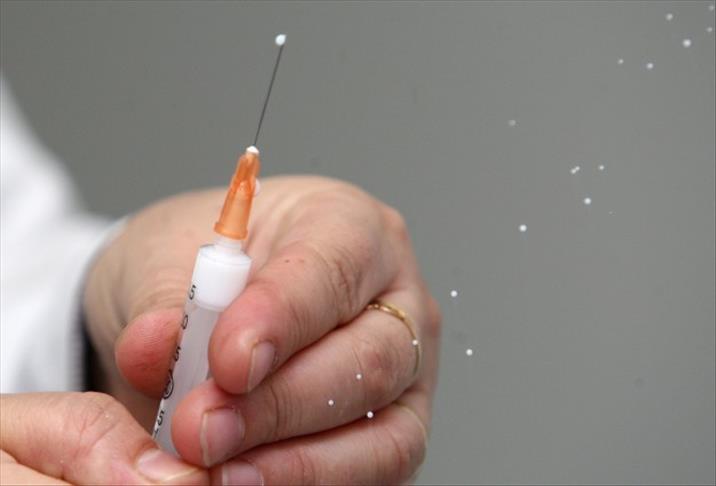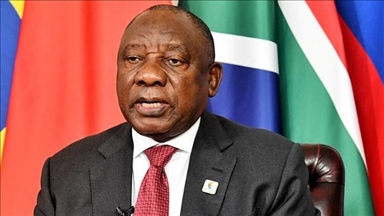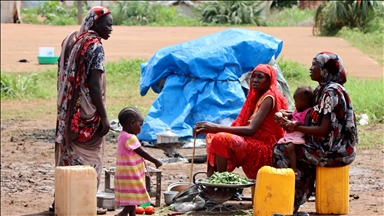
By Okech Francis
JUBA
The scourge of HIV/AIDS is being overlooked in South Sudan, activists warn, as the government and civil society remain focused on other problems caused by the country's year-long political crisis.
"The problem is, there's no proper system of treatment for those living with HIV/AIDS," Lole Laila Lole, chairman of the South Sudan Network for People Living with HIV/AIDS, told The Anadolu Agency in an interview conducted in Juba.
"When the country emerged from the war and gained independence [in 2011], no programs were set up to comprehensively address the issue of HIV," he said.
"We are sitting on a time bomb [regarding HIV/AIDS]; anything can happen," Lole warned. "We are doing badly in terms of treatment, in terms of awareness and in terms of campaigning."
The activist added: "Medical facilities are empty. If you can, you cross the border to neighboring countries to access treatment. If you can't, you die."
According to Lole, the country's main HIV/AIDS center – which lacks both equipment and staff – has been overwhelmed by people seeking advice on the virus.
"The center at Juba Teaching Hospital receives 150 patients a day even though it has no proper facilities," he said.
"There are no doctors at the center, only 'medical assistants'," the activist complained. "It has four counselors who should counsel eight people a day at most – but now we have 150."
"People are getting frustrated," he added.
The HIV facility at the Juba Teaching Hospital, South Sudan's main referral hospital, currently has some 6,000 HIV patients on antiretroviral (ARV) treatments.
According to Lole, another 25,000 people have registered for treatment at health centers across the country.
The South Sudan AIDS Commission puts the country's HIV prevalence rate at 2.6 percent.
"In terms of total number, we have about 152,000 people [with AIDS], based on a 2012 surveillance report," Habib Daffalla Awongo, the commission's director-general for program coordination, told AA.
Lole, however, questions these figures.
"With a prevalence rate of 2.6 percent out of 12 million South Sudanese, the number is certainly more than 150,000," he argued.
Challenges
Catherine Alu, an HIV-positive woman living in Juba, says she is struggling to receive treatment.
"It's very difficult to access medicine [ARVs] when what I am given runs out," she told AA. "Usually, we're given medicine for one month, but now sometimes we only get it for two weeks."
"There are many sick people in Juba now who have failed to get treatment," Alu lamented.
Alfred Joseph Waja, 46, tested positive for HIV in 2008, but had done well over the past five years with the assistance of the World Food Program.
But with the ongoing political crisis, things have changed – especially with respect to food supplies.
"When I tested positive, I thought it was the end of my life. But because of counseling, I found that being HIV-positive is not the end of the world," Waja told AA.
"We get drugs from Juba Teaching Hospital, but the problem is that the support given by the World Food Program is coming to an end," he lamented.
Waja said that monthly food rations included salt, sugar, sorghum (cereal), beans and cooking oil.
"Since this war broke out, we can miss two months [without food supplies]," he noted. "The ratio is even less."
"It affects me very much because taking drugs without food is difficult," he said.
South Sudan has been shaken by violence since December of last year, when President Salva Kiir accused Riek Machar, his sacked vice president, of plotting to overthrow his regime.
Hundreds of thousands of South Sudanese have since been displaced in the fighting between the two rivals, leading to an increasingly dire humanitarian situation countrywide.
Awongo, the AIDS Commission official, said the crisis had gravely impeded the commission's work.
"The crisis affected us – and still affects us – in many ways," he told AA. "We had a number of activities, but partners had to pull out. Services were channeled to emergencies."
"We lost clients because they were in displacement areas and there were no treatments," Awongo lamented. "The war has also left us many more orphans to think of, and some of them are HIV-positive."
Awongo cited additional challenges associated with combating HIV/AIDS.
"The level of awareness is still very low," he told AA.
The commission is currently appealing to the army leadership and Interior Ministry to enlist soldiers and police to help raise HIV/AIDS awareness.
"We are working with partners, but we still have a lot of financial constraints, the capacity of institutions, human resources; we have very limited facilities," Awongo complained.
He added: "We have 22 treatment centers across the country and they are not evenly distributed."
"As we move forward," the official went on, "we need to integrate HIV/AIDs centers in all health services."
"This is in the ambitious national plan: a five-year plan from 2013 to 2018. But what remains are the resources and funds to work out that plan," said Awongo.
"Stigma and discrimination remain one of our biggest challenges," he stressed. "With stigma, people cannot go into groups; they end up living in denial."
"As much as we encourage people to come to treatment centers," Awongo noted, "only a few are willing to come because of fears of discrimination."
"But we're encouraging them to come anyway," he added.
Anadolu Agency website contains only a portion of the news stories offered to subscribers in the AA News Broadcasting System (HAS), and in summarized form. Please contact us for subscription options.



